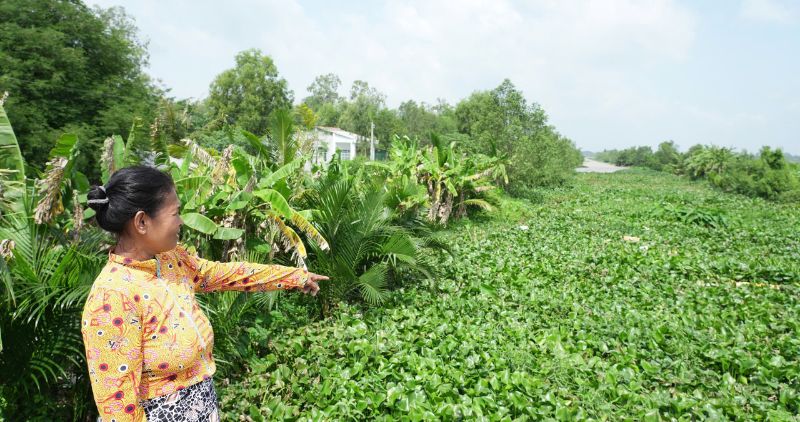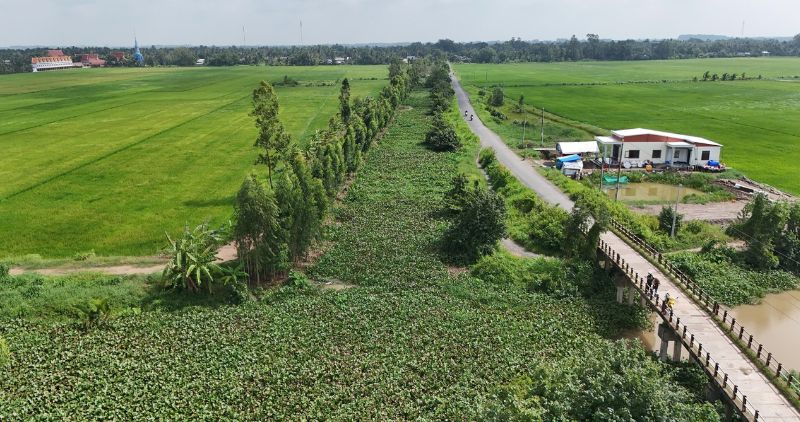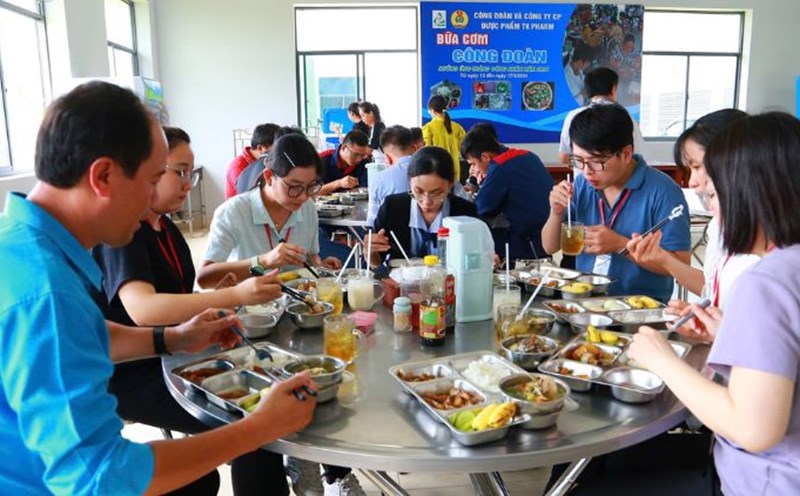Harvesting without roads, rice prices are forced
The dense development of water hyacinth on canals and ditches in Chau Thanh commune has seriously affected the production activities of local people.
Ms. Thach Thi Phuong, a resident of Bau Son hamlet, said that my family has more than 6 hectares of rice fields, but the fields are deep inside, and if we want to go to the fields, we have to go by water. Since the potholes cover the canals, boats cannot enter, the harvested rice has to be moved into bags to the embankment to be loaded onto the truck, which is very difficult.
According to Ms. Phuong, manual transportation costs more labor, prolongs harvest time, and affects rice quality.
"The stewards see it as extreme, if they can't end it, they will force the price. Compared to rice sold outside the normal fields, I sell it for about 400500 VND/kg lower than the market price, she said.

In the same situation, Ms. Kha Mau - another household in Bau Son hamlet - said that her family cultivates nearly 2 hectares of rice fields, located far from the main road, and transportation is entirely dependent on waterways. However, since the plant has developed densely, harvesting has become much more arduous.
According to Ms. Kha Mau, each harvest requires nearly 1 million VND to hire people to carry rice from the fields to the canal bank because the boat cannot get there because of the dense economy. When it rains, the fields are flooded, the water roads are clogged, vehicles cannot enter, everything is jammed.
"The price is extremely high but the price is constantly being pushed down. After finishing a crop, the profit is not much, sometimes there is a loss. If it continues like this, rice growers like me don't know how long they can last," she said, her voice was full of worry.
Research on the use of water hyacinth as a thermal power source, organic fertilizer
Not only affecting the travel and transportation of agricultural products, thick-growing water hyacinth also causes flow congestion, seriously affecting irrigation work for production.
Mr. Thach Phuong - Head of the Bau Son Hamlet Front Work Committee - said that the entire area has more than 300 hectares of rice fields, but currently all 6 levels 3 and 5 levels 2 canals and 1 level 1 route are flooded all year round. If we finish cleaning up, we can go back and forth, it's not a problem.
"The decomposing of dead water bottles also affects the quality of water, the environment and the operation of pumping stations. Meanwhile, the work of collecting water hyacinth is mainly based on on on-site forces, manual and lacking sustainability," Mr. Phuong added.

Speaking with Lao Dong, Mr. Nguyen Quynh Thien - Vice Chairman of Vinh Long Provincial People's Committee said that Tra Vinh Irrigation Works Management and Exploitation Company Limited currently manages more than 1,200 level 1 and 2 canals with a total length of over 2,600km.
Many level 2 and inland canals have been covered with water hyacinth for many years, but cannot be completely handled because the water hyacinth grows too quickly.
The province has coordinated with a number of units, including Tra Vinh University, to survey the ability to collect and process glass household chard into biological materials.
We are studying a model of using water hyacinth to produce biomass electricity, biogases or make organic fertilizers. If implemented, it will both solve pollution and create more income for people, said Mr. Thien.











